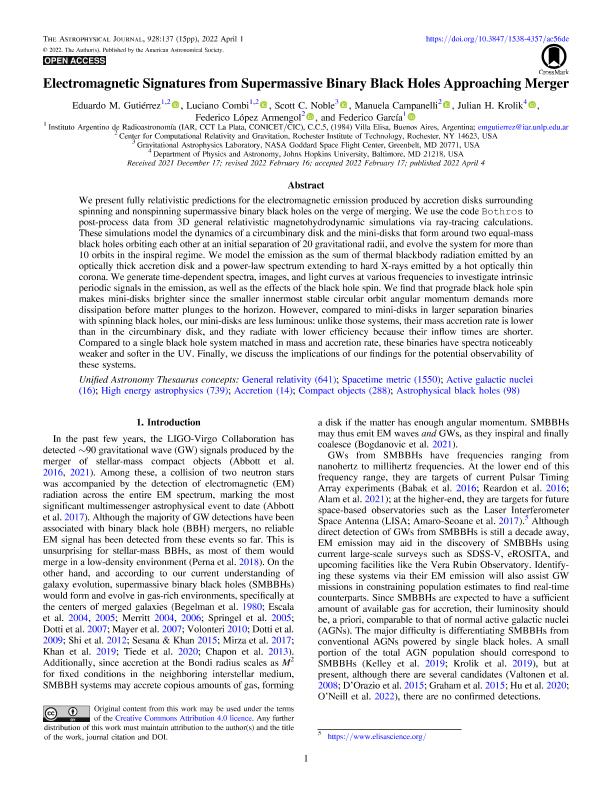Artículo
Electromagnetic Signatures from Supermassive Binary Black Holes Approaching Merger
Gutiérrez, Eduardo Mario ; Combi, Luciano
; Combi, Luciano ; Noble, Scott C.; Campanelli, Manuela; Krolik, Julian H.; López Armengol, Federico; García, Federico
; Noble, Scott C.; Campanelli, Manuela; Krolik, Julian H.; López Armengol, Federico; García, Federico
 ; Combi, Luciano
; Combi, Luciano ; Noble, Scott C.; Campanelli, Manuela; Krolik, Julian H.; López Armengol, Federico; García, Federico
; Noble, Scott C.; Campanelli, Manuela; Krolik, Julian H.; López Armengol, Federico; García, Federico
Fecha de publicación:
04/2022
Editorial:
IOP Publishing
Revista:
Astrophysical Journal
ISSN:
0004-637X
Idioma:
Inglés
Tipo de recurso:
Artículo publicado
Clasificación temática:
Resumen
We present fully relativistic predictions for the electromagnetic emission produced by accretion disks surrounding spinning and nonspinning supermassive binary black holes on the verge of merging. We use the code Bothros to post-process data from 3D general relativistic magnetohydrodynamic simulations via ray-tracing calculations. These simulations model the dynamics of a circumbinary disk and the mini-disks that form around two equal-mass black holes orbiting each other at an initial separation of 20 gravitational radii, and evolve the system for more than 10 orbits in the inspiral regime. We model the emission as the sum of thermal blackbody radiation emitted by an optically thick accretion disk and a power-law spectrum extending to hard X-rays emitted by a hot optically thin corona. We generate time-dependent spectra, images, and light curves at various frequencies to investigate intrinsic periodic signals in the emission, as well as the effects of the black hole spin. We find that prograde black hole spin makes mini-disks brighter since the smaller innermost stable circular orbit angular momentum demands more dissipation before matter plunges to the horizon. However, compared to mini-disks in larger separation binaries with spinning black holes, our mini-disks are less luminous: unlike those systems, their mass accretion rate is lower than in the circumbinary disk, and they radiate with lower efficiency because their inflow times are shorter. Compared to a single black hole system matched in mass and accretion rate, these binaries have spectra noticeably weaker and softer in the UV. Finally, we discuss the implications of our findings for the potential observability of these systems.
Archivos asociados
Licencia
Identificadores
Colecciones
Articulos(IAR)
Articulos de INST.ARG.DE RADIOASTRONOMIA (I)
Articulos de INST.ARG.DE RADIOASTRONOMIA (I)
Citación
Gutiérrez, Eduardo Mario; Combi, Luciano; Noble, Scott C.; Campanelli, Manuela; Krolik, Julian H.; et al.; Electromagnetic Signatures from Supermassive Binary Black Holes Approaching Merger; IOP Publishing; Astrophysical Journal; 928; 2; 4-2022
Compartir
Altmétricas



